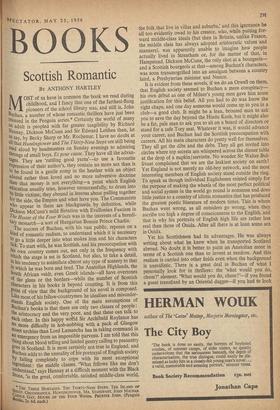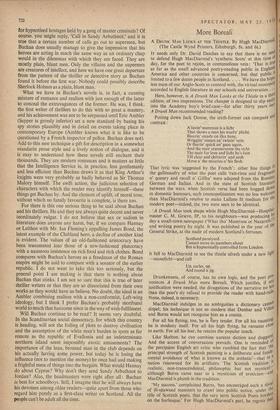BOOKS
Scottish Romantic
BY ANTHONY HARTLEY OST of us have in common the book we read during childhood, and I fancy that one of the farthest-flung pioneers of the school library was, and still is, John 131101aH, a number of whose romantic thrillers have just been reissued in the Penguin series.* Certainly the world of many fl adult is peopled with far greater tangibility by Richard Hannay, Dickson McCunn and Sir Edward Leithen than, let U s say, by Becky Sharp or Mr. Rochester. I have no doubt at all that Huntingtower and The Thirty-Nine Steps are still being read aloud by headmasters on Sunday evenings to admiring throngs of small boys. Et pour cause. They have all the advan- tages. They are `rattling good yarns'—to use a favourite expression of their author's, they contain no more sex than is to be found in a gentle romp in the heather with an object adored rather than loved and no more subversive doctrine than that money is not everything—a point which English education usually tries, however unsuccessfully, to drum into Its little victims; they abound in lessons about pulling together for the side, the Empire and what have you. The Communists who appear in them are blackguards by definition, while Dickson McCunn's mild flirtation with Evallonian Fascism in Tize House of the Four Winds was in the interests of a heredi- tary monarch—a sort of Hungarian Bonnie Prince Charlie. Ihe success of Buchan, with his vast public, reposes OTT a E ind of romantic realism, to understand which it is necessary to go a little deeper into what makes him and his characters tick To start with, he was Scottish, and his preoccupation with his own country comes out, not only in the frequency with ,vvhich the stage is set in Scotland, but also, to take a detail, fl his tendency to assimilate almost any type of scenery to that in which he was born and bred. The Anatolian Highlands, the South African veldt, even Greek islands—all have overtones Of the glens or the borders—while the number of Scottish characters in his books is beyond counting. It is from this Point of view that the background of his novel is composed Like most of his fellow-countrymen he idealises and misunder- ,stands English society. One of the main assumptions of -unchan's books is that there are only two classes of people : the aristocracy and the very poor, and that these can talk to each other. In this happy world Sir Archibald Roylance has no more difficulty in hob-nobbing with a pack of Glasgow str eet urchins than Lord Lamancha has in taking command in an t emergency from an impossible parvenu. I am told that this h in g.about blood telling and landed gentry calling to peasantry toes in Scotland. It is most certainly not true in England, and uc by .an adds to the unreality of his portrayal of English society failing completely to cope with its most exceptional thgrpdient : the middle classes. 'What fellows like me don't und !rstand,' says Hannay at a difficult moment with the Black Skint, 'is the great, comfortable, satisfied middle-class world, t._ HE THREE HOSTAGES. THE THIRTY-NINE STEPS. THE ISLAND OF GRELNmANTLE. HUNTINGTOWER. MR. STANDFAST. JOHN MACNAB. bCAsT LE GAY. HoUsE OF THE FOUR WINDS. PRESTER JOHN. (Penguin 30 ks, 2s. 6d. each.)
401
the folk that live in villas and suburbs,' and this ignorance he all too evidently owed to his creator, who, while putting for- ward middle-class ideals (but then in Britain, unlike France, the middle class has always adopted aristocratic values and manners), was apparently unable to imagine how people actually lived in Streatham or, for the matter of that, in Hampstead. Dickson McCunn, the only shot at a bourgeois— and a Scottish bourgeois at that—among Buchan's characters, was soon transmogrified into an amalgam between a country laird, a Presbyterian minister and Nestor.
It is evident from these novels, if we do an Orwell on them, that English society seemed to Buchan a mere conspiracy— his own debut as one of Milner's young men gave him some justification for this belief. All you had to do was know the right chaps, and one day someone would come up to you in a club—a good club. It might be a lean, bronzed man to ask you to save the day beyond the Hindu Kush, but it might also be a fat, pale man to ask you to sit on a board of directors or stand for a safe Tory seat. Whatever it was, it would advance your career, and Buchan had the Scottish preoccupation with careers. All his main characters do pretty well for themselves. They all get the dibs and the debs. They all get invited into circles where top secrets are whispered across the dinner table at the drop of a napkin/serviette. No wonder Sir Walter Bul- livant complained that we are the leakiest society on earth! Yet England is not merely an old-boy network, and the most interesting members of English society stand outside the ring. To speak as though individual Englishmen existed simply for the purpose of making the wheels of the most perfect political and social system in the world go round is nonsense and does little justice to a country of idiotic romantics that has produced the greatest poetic literature of modern times. This is where Buchan went wrong, as all outsiders go wrong, when they ascribe too high a degree of consciousness to the English, and that is why his portraits of English high life are rather less real than those of Ouida. After all there is at least some sex in Ouida.
Yet his Scottishness had its advantages. He was always writing about what he knew when he transported Scotland abroad. No doubt it is better to paint an Anatolian moor in terms of a Scottish one than to invent at random. And this realism is carried into other fields even when the background is unrealistic. There is a great deal in Buchan of what I personally look for in thrillers : the 'what would you do, chum?' element. 'What would you do, chum?'—if you found a guest transfixed by an Oriental dagger—if you had to look for hypnotised hostages held by a gang of master criminals? Of course, you might reply, 'Call in Sandy Arbuthnot,' and it is true that a certain number of calls go out to supermen, but Buchan does usually manage to give the impression that his heroes are acting in much the same way as an ordinary chap would in the dilemmas with which they are faced. They are mostly plain, blunt men. Only the villains and the supermen are creatures of intellect, and here we have one great departure from the pattern of the thriller or detective story as Buchan found it before the first war. Nobody could possibly describe Sherlock Holmes as a plain, blunt man.
What we have in Buchan's novels is, in fact, a cunning mixture of romance and realism with just enough of the latter to conceal the extravagances of the former. He was, I think, the first writer of thrillers to do this with so great a mastery, and his achievement was not to be surpassed until Eric Ambler (Sapper is grossly inferior) set a new standard by basing his spy stories plausibly and in detail on events taking place in contemporary Europe (Ambler knows what it is like to be questioned by a French inspector of police. Buchan does not). Add to this new technique a gift for description in a somewhat mandarin prose style and a lively notion of dialogue, and it is easy to understand how these novels still enchant their thousands. They are modern romances and it matters as little that the Intelligence Service is, in practice, less gentlemanly and less efficient than Buchan draws it as that King Arthur's knights were very probably as badly behaved as Sir Thomas Malory himself. The swift action, the judicious selection of characters with which the reader may identify himself—these things get Buchan by. And the element of uplift, of moral tone, without which no family favourite is complete, is there too.
For there is this one serious thing to be said about Buchan and his thrillers. He and they are.always quite decent and never inordinately vulgar. I do not believe that sex or sadism in literature does anyone any harm, but, if we compare Hannay or Leithen with Mr. Ian Fleming's appalling James Bond, the latest example of the Clubland hero, a decline of another kind is evident. The values of an old-fashioned aristocracy, have been transmuted into those of a new-fashioned plutocracy with a nauseous insistence on rich food and rich clothes. Bond compares with Buchan's heroes as a freedman of the Roman empire might be said to compare with a senator of the earlier republic. I do not want to take this too seriously, but the general point I am making is that there is nothing about Buchan that stinks. I am not so sure that this is true of later thriller writers or that they are so dissociated from their own works as they would have us believe. No doubt, the ideal is an Ambler combining realism with a non-conformist, Left-wing ideology, but I think I prefer Buchan's probably moribund world to much that has come since in the way of wish-fulfilment. Will Buchan continue to be-read? It seems very doubtful. In the Scandinavian social democracy, for which this country is heading, will not the foiling of plots to destroy civilisation and the assumption of the white man's burden in spots as far remote as the republic of Evallonia and an indeterminate northern island seem impossibly exotic amusements? The importance of the lean, bronzed man in the club depends on his actually having some power, but today he is losing the influence (not to mention the money) he once had and making a frightful mess of things into the bargain. What would Hannay do about Cyprus? Why don't they send Sandy Arbuthnot to Jordan? Alas, the headmasters were right after all : Buchan is best for schoolboys. Still, I imagine that he will always have his devotees among older readers—quite apart from those who regard him purely as a first-class writer on Scotland. All the people can't be adult all the time.











































 Previous page
Previous page